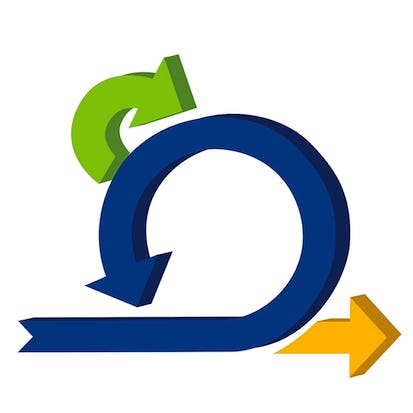- Level Foundation
- المدة 10 ساعات hours
- الطبع بواسطة LearnQuest
-
Offered by

عن
This course is designed to help Scrum beginners learn the foundational knowledge to become proficient with Agile Scrum. Throughout the course, learners will explore Agile methodologies and benefits of building incrementally. They will also learn about the roles within Scrum teams, events that happen during a Sprint, Agile artifacts, and the Definition of Done for a Sprint.الوحدات
Welcome
2
Videos
- Certified Scrum Master Introduction and Curriculum
- Welcome to this Course
Agile Methodologies, Manifesto values and Principles
1
Assignment
- Practice Review
1
Discussions
- Discussion: Manifesto Values
4
Videos
- Module Introduction
- Agile Methodologies
- Agile Manifesto Values
- Agile Manifesto Principles
3
Readings
- Scrum, Lean, XP, and DevOps
- Agile Manifesto Values
- Agile Manifesto Principles
Agile Economics, Agile versus Waterfall, and Agile Myths and Benefits
1
Discussions
- Advantages to Building Incrementally
4
Videos
- Agile Economics
- Agile versus Waterfall
- More Agile Manifesto Concepts
- Agile Myths and Benefits
1
Readings
- Agile Economics
Quiz
1
Assignment
- Module 2 Quiz
Scrum Pillars, Values, Roles, and Terms
1
Discussions
- Discussion: Scrum Pillars
4
Videos
- Module Introduction
- Scrum Pillars and Values
- Scrum Roles
- Scrum Terminology
1
Readings
- Scrum and Agile Terminology
Scrum Teams
1
Assignment
- Practice Quiz
1
Discussions
- The Scrum Master's role as a servat Leader
5
Videos
- Scrum Teams
- Scrum Team - Roles
- Roles - The Scrum Master
- Scrum Master Behavior, Facilitation, and Duties
- Roles - The Product Owner
3
Readings
- The Scrum Team
- The Scrum Master
- The Product Owner
User Stories and Task Management
3
Videos
- User Stories
- Task Management
- Scrum Master and Strong Questions
1
Readings
- Assignment - Begin Writing User Stories
Quiz
1
Assignment
- Module 3 Review
The Sprint and Scrum Events
6
Videos
- The Sprint
- The Vision Meeting and Product Backlog
- The Sprint Planning Meeting
- The Daily Stand-Up and Backlog Refinement
- The Sprint Review and Retrospective Meetings
- The Sprint Calendar
6
Readings
- The Sprint
- The Product Vision or Epic Meeting
- Assignment: Build a Sprint Backlog/ Sprint Plan
- The Sprint Planning Meeting
- Daily Standup Meeting and Backlog Refinement
- The Sprint Review Meeting
Quiz
1
Assignment
- Module 4 Review
Agile Artifacts: Vision, Product Increment, Backlogs: Product, Sprint
1
Assignment
- Practice Review
3
Videos
- Sprint Artifacts
- The Product Increment and Vision
- Backlogs: Product, Release, and Sprint
2
Readings
- The Product Increment and Product Vision
- The Product, Sprint and Release Backlogs
Story Points and Definition of Done (DoD)
1
Discussions
- Discussion: Story Points
2
Videos
- Story Points
- The Definition of Done (DoD)
4
Readings
- Story Points
- Assignment: Estimate the Stories in the Sprint Backlog or Sprint Plan
- The Definition of Done
- Assigment: Definition of Done
Quiz
1
Assignment
- Module 5 Quiz
Auto Summary
Embark on a transformative journey into the world of Agile Scrum with the "Introduction to Scrum Master Training" course, a foundational program offered by Coursera. Perfect for beginners in the Business & Management domain, this immersive course delves into essential Agile methodologies, underscoring the advantages of incremental development. Learners will gain a comprehensive understanding of Scrum team roles, key events within a Sprint, crucial Agile artifacts, and the all-important Definition of Done. Guided by expert instructors, participants will acquire the skills needed to proficiently navigate and apply Scrum principles in real-world scenarios. Over the span of 600 minutes, this course promises to build a solid foundation in Scrum, empowering learners to excel in Agile project environments. Available through a Starter subscription, this course is ideal for aspiring Scrum Masters, project managers, and anyone keen on mastering Agile practices. Join now to kickstart your journey towards Agile proficiency and elevate your project management capabilities.

Jim Sullivan


